
Proceedings of the Institution of Mechanical Engineers Part O-Journal of Risk and Reliability
Scope & Guideline
Championing Excellence in Safety, Risk, and Reliability Studies.
Introduction
Aims and Scopes
- Reliability Engineering and Maintenance:
The journal emphasizes methodologies for assessing and enhancing the reliability of mechanical and structural systems, including predictive maintenance strategies and condition-based maintenance. - Risk Assessment and Management:
Papers published in the journal frequently tackle risk identification, quantification, and mitigation strategies across various industries, including energy, transportation, and manufacturing. - Data-Driven Approaches:
A significant focus is placed on employing advanced data analytics, including machine learning and deep learning techniques, for predictive modeling of system failures and performance degradation. - Complex System Analysis:
The journal also explores the reliability of complex systems with multiple interacting components, utilizing probabilistic models, Bayesian networks, and system-level analyses. - Safety and Resilience Engineering:
Research addressing safety assessments, resilience strategies, and risk-informed decision-making in engineering systems is a consistent theme, particularly in critical infrastructure.
Trending and Emerging
- Machine Learning and AI in Reliability Engineering:
The integration of machine learning and artificial intelligence techniques for predictive maintenance and fault diagnosis is a rapidly growing theme, enabling more accurate and efficient reliability assessments. - Resilience Engineering:
Research focusing on resilience strategies for complex systems, particularly in response to disruptions and failures, is trending, highlighting the importance of adaptive and robust engineering solutions. - Cyber-Physical Systems and Digital Twins:
The exploration of digital twins and cyber-physical systems for real-time monitoring and predictive analytics in risk management is becoming increasingly prominent. - Sustainability and Environmental Risk Assessment:
Emerging themes around sustainability and environmental considerations in risk assessment and reliability engineering are gaining traction, reflecting broader societal concerns. - Integrated Risk and Reliability Frameworks:
There is a growing trend towards developing integrated frameworks that combine reliability engineering with risk assessment, addressing the interdependencies of systems in complex environments.
Declining or Waning
- Traditional Statistical Methods:
There is a noticeable reduction in the application of classical statistical methods for reliability analysis, as newer data-driven and machine learning approaches gain traction. - Generalized Reliability Models:
The use of generalized models for reliability assessment, especially those that do not incorporate modern computational techniques, seems to be less prevalent in recent publications. - Conventional Risk Assessment Frameworks:
The journal has seen fewer papers focused on traditional risk assessment frameworks that do not leverage advanced data analytics or machine learning methodologies. - Single-Factor Analysis:
Research solely focused on single-factor analysis for reliability and risk assessment is declining, as there is a growing emphasis on multi-faceted and integrated approaches.
Similar Journals
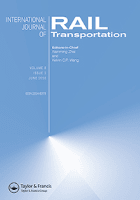
International Journal of Rail Transportation
Driving insights in rail transportation and beyond.International Journal of Rail Transportation is a premier academic publication dedicated to advancing the field of rail transportation, published by Taylor & Francis Ltd. With an impressive convergence of scholarly contributions from 2013 to 2024, the journal aims to disseminate high-quality research and innovative ideas in automotive engineering, mechanics of materials, and transportation. The journal proudly holds a Q1 ranking in both Automotive Engineering and Mechanics of Materials for 2023, as well as a Q2 ranking in Transportation, signifying its impact and relevance in the respective disciplines. Additionally, it is recognized within the top percentiles in its Scopus rankings, affirming its commitment to producing significant insights that inform both academic and industrial practices. While currently not open access, the journal strives to connect researchers, professionals, and students with cutting-edge developments in rail transportation. By fostering collaboration and knowledge sharing, the *International Journal of Rail Transportation* serves as an essential resource for those seeking to push the boundaries of transport engineering and contribute to sustainable infrastructure solutions.
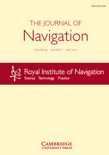
JOURNAL OF NAVIGATION
Connecting Theory and Practice in Ocean EngineeringJournal of Navigation, published by Cambridge University Press, is a premier academic journal that has served the maritime community since its inception in 1948. With an esteemed ISSN of 0373-4633 and an E-ISSN of 1469-7785, this journal is recognized for its rigorous peer-reviewed research that significantly contributes to the fields of Ocean Engineering and Oceanography. The journal ranks in the Q2 quartile, showcasing its position among the top-tier publications in these domains, with impressive Scopus rankings placing it 24th in Oceanography and 22nd in Ocean Engineering. While currently not an open-access publication, it offers valuable insights and advancements relevant to researchers, professionals, and students, fostering a deeper understanding of navigation in both theoretical and applied contexts. The Journal of Navigation aims to disseminate innovative research that impacts maritime practices and enhances navigational safety and efficiency.
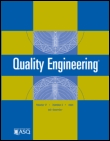
Quality Engineering
Championing the future of quality in engineering practices.Quality Engineering, published by Taylor & Francis Inc, is a leading journal in the field of Industrial and Manufacturing Engineering and Safety, Risk, Reliability, and Quality. With a focus on the advancement of quality assurance and management practices, this journal has been a valuable resource since its inception, featuring research that spans from 1970 to the present day. The journal holds a commendable placement in the 2023 category quartiles, ranked Q2 in both relevant fields, highlighting its significance in contributing to innovative methodologies and solutions in quality engineering. Although currently not an open access publication, it continues to attract a wide array of contributions from researchers, professionals, and students dedicated to enhancing quality in engineering processes. With a Scopus rank reflecting its solid standing—75th percentile in Safety, Risk, Reliability and Quality and 62nd percentile in Industrial and Manufacturing Engineering—Quality Engineering remains an essential platform for disseminating knowledge that fosters excellence in the engineering domain.

Structural Monitoring and Maintenance, An International Journal
Transforming insights into structural monitoring excellence.Structural Monitoring and Maintenance, An International Journal is a prestigious publication dedicated to advancing knowledge in the fields of civil and structural engineering, as well as safety, risk, reliability, and quality assessment. Published by TECHNO-PRESS in South Korea, this journal serves as a vital platform for researchers, professionals, and students interested in the latest methodologies, technologies, and case studies pertaining to structural monitoring, assessment, and maintenance practices. With its current Q3 category ranking in both structural engineering and safety metrics, the journal aims to promote high-quality research that addresses real-world challenges in structural integrity and safety. As the journal converges its scope from 2014 to 2024, it continues to welcome innovative studies that contribute to the development of sustainable and resilient infrastructures worldwide. Despite the absence of an open-access option, the substantial readership is ensured through its indexed positions, currently ranked among the top journals in its field according to Scopus metrics. Engage with groundbreaking research that shapes the future of structural engineering and safety practices by delving into the contributions this journal offers.
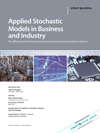
APPLIED STOCHASTIC MODELS IN BUSINESS AND INDUSTRY
Revolutionizing Operations with Applied Stochastic ModelsApplied Stochastic Models in Business and Industry, published by Wiley, is a preeminent journal dedicated to advancing the field of stochastic modeling in various business and industry contexts. With an ISSN of 1524-1904 and an E-ISSN of 1526-4025, this journal serves as a vital platform for researchers and practitioners aiming to leverage stochastic techniques to address complex decision-making and operational challenges. The journal holds prestigious rankings, including Q2 in Business, Management and Accounting, and has converged years spanning from 1999 to 2024. It is distinguished by its wide scope, focusing on all aspects of modeling and simulation, as well as decision sciences and operations research. Although it does not operate as an open-access journal, its significant impact factor and Scopus rankings ensure that the valuable insights published within reach a broad audience. By fostering high-quality research and discourse, Applied Stochastic Models in Business and Industry plays a crucial role in driving innovation and excellence in its fields.
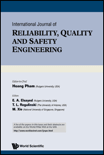
International Journal of Reliability Quality and Safety Engineering
Enhancing Engineering Practices through Quality ResearchThe International Journal of Reliability Quality and Safety Engineering, published by World Scientific Publishing Co Pte Ltd, is a leading platform for disseminating cutting-edge research in the fields of reliability, quality, and safety engineering. With an impressive scope that spans across aerospace, electrical engineering, nuclear energy, and industrial manufacturing, this journal serves as a critical resource for researchers and professionals aiming to enhance system dependability and operational excellence. Indexed in Scopus, it holds a respectable Q3 ranking across various categories in 2023, reflecting its growing influence in the academic community. Although currently not open access, it provides ample opportunities for scholars to publish impactful studies from its extensive database, which has evolved since 1996. The journal's commitment to advancing knowledge in reliability and safety engineering makes it a pivotal resource for those dedicated to improving engineering practices and protocols worldwide.
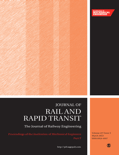
PROCEEDINGS OF THE INSTITUTION OF MECHANICAL ENGINEERS PART F-JOURNAL OF RAIL AND RAPID TRANSIT
Exploring Breakthroughs in Rail Systems and InfrastructurePROCEEDINGS OF THE INSTITUTION OF MECHANICAL ENGINEERS PART F - JOURNAL OF RAIL AND RAPID TRANSIT is a premier academic journal published by SAGE Publications Ltd, focusing on the latest advancements in rail transportation and rapid transit systems. With an ISSN of 0954-4097 and E-ISSN of 2041-3017, this journal has garnered significant attention in the field, achieving a Q2 category ranking in Mechanical Engineering and securing a Scopus rank of #192 out of 672, placing it in the 71st percentile. Covering converged years from 1989 to 2024, it provides a platform for innovative research and discussions that address the complexities and evolving technologies within the rail industry. Its publication draws contributions from esteemed researchers, professionals, and students alike, fostering a crucial dialogue on sustainability, efficiency, and advancements in transit infrastructure. While the journal is not open access, it remains a vital resource for those committed to pushing the boundaries of mechanical engineering and rail systems development.

Eksploatacja i Niezawodnosc-Maintenance and Reliability
Empowering engineers through open access insights.Eksploatacja i Niezawodnosc-Maintenance and Reliability, published by the POLISH MAINTENANCE SOC, stands as a premier Open Access journal dedicated to the fields of industrial and manufacturing engineering as well as safety, risk, reliability, and quality. With its ISSN 1507-2711, the journal has been a pivotal resource since 2004, fostering knowledge dissemination and innovation within the engineering community. The journal boasts an impressive standing, reflected in its Q2 Quartile ranking in both relevant categories for 2023, and Scopus ranks indicating its significant impact in the domains it covers; specifically, it is positioned at the 50th rank in Safety, Risk, Reliability and Quality and 97th in Industrial and Manufacturing Engineering. Researchers and professionals exploring the intricacies and advancements in maintenance and reliability will find an array of pertinent studies, insights, and methodologies within its publications. Embracing an open access model, this journal not only enhances visibility and accessibility of research but also supports the vital exchange of ideas in the global engineering landscape.
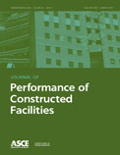
JOURNAL OF PERFORMANCE OF CONSTRUCTED FACILITIES
Unveiling the Future of Constructed Facility ExcellenceJOURNAL OF PERFORMANCE OF CONSTRUCTED FACILITIES, published by the ASCE-AMERICAN SOCIETY OF CIVIL ENGINEERS, is a leading peer-reviewed journal dedicated to the field of civil engineering with a strong emphasis on the performance assessment and sustainability of constructed facilities. Established in 1987 and converging through 2024, this journal has garnered a solid reputation with an impressive Q2 quartile ranking across key areas including Building and Construction, Civil and Structural Engineering, and Safety, Risk, Reliability and Quality. The journal's Scopus rankings further underline its significance, being positioned within the top percentiles of these domains. As it aims to publish innovative research, case studies, and reviews, the journal serves as a vital resource for professionals and academics who are keen on advancing their understanding of the complexities associated with the performance and reliability of civil infrastructure. Researchers and practitioners interested in the latest advancements in construction performance can greatly benefit from the insights and findings published in this esteemed journal.
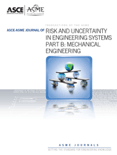
ASCE-ASME Journal of Risk and Uncertainty in Engineering Systems Part B-Mechanical Engineering
Innovating Risk Assessment for Engineering ExcellenceASCE-ASME Journal of Risk and Uncertainty in Engineering Systems Part B-Mechanical Engineering, published by the reputable ASME, is a leading platform dedicated to advancing knowledge in the field of mechanical engineering with a particular emphasis on risk assessment and uncertainty analysis. With an ISSN of 2332-9017 and an E-ISSN of 2332-9025, this journal has established itself as a significant contributor to ongoing research in safety, risk, and reliability, consistently ranking in the Q2 quartile for Mechanical Engineering as well as Safety Research categories. As evidenced by its impressive Scopus rankings—including a notable 80th percentile in Safety Research—this journal fosters high-quality research that informs engineering practices and enhances safety protocols. Operating under a traditional access model, it aims to provide researchers, professionals, and students with essential insights and methodologies to address contemporary challenges in engineering systems. Each contribution reflects an aim to bridge theory and application, thus making the journal an invaluable resource for stakeholders striving for excellence in mechanical engineering and safety management.